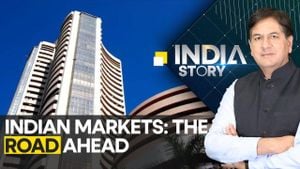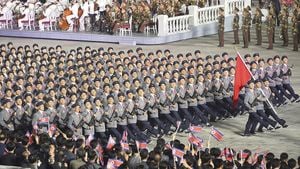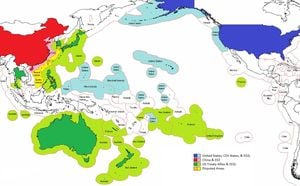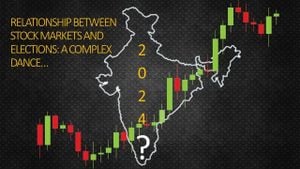Hindu nationalism is quickly becoming a controversial topic within the Indian American communities, stirring both enthusiasm and apprehension as the political climate grows increasingly polarized. Recent developments indicate this ideology not only affects how millions engage within their own communities but also how they interact with the broader societal and political fabric of the United States.
Hindu nationalism, often viewed as rooted entirely within India, is beginning to weave its way through Indian American politics. This conversation gained significant traction during the 2024 election season, which showcased the complex and often contradictory sentiments held by Indian Americans. A noticeable trend is the growing visibility of Republican voices within the Indian-American bloc, shedding light on the multiplicity of political opinions among this demographic.
The political dynamics within the community are perhaps best highlighted by the interest shown from high-profile figures such as Donald Trump and Kamala Harris. Trump’s vocal admiration for Indian Prime Minister Narendra Modi—he often refers to him as “the nicest human being”—has stirred both excitement and skepticism within Indian American circles. Despite this flattery, polls consistently show Indian Americans leaning toward Democratic candidates, with about three-quarters of the population voting for Hillary Clinton and Joe Biden in the past two elections. Harris's identity as the first vice president with Indian roots resonates strongly with many, and surveys indicate she continues to maintain substantial support from this demographic.
Conversely, some segments of the community are drawn to the Republican Party, largely influenced by figures like Nikki Haley and Vivek Ramaswamy, both of whom have roots tracing back to India. These individuals embody the possibility of Indian Americans occupying significant political positions, and their endorsements often spark discussions around identity politics and representation. With both Haley and Ramaswamy presenting themselves as champions for conservative ideologies, one cannot ignore the shifting figures within Indian American political affiliation.
The increased visibility of Republican voices is heralded as significant by some community members. Research has indicated, for example, some conversations on social media within the Indian diaspora encouraging support for Trump, primarily focusing on his promises of stricter immigration policies and perceived economic benefits. This has sparked nuanced conversations around identity and allegiance, particularly among younger Indian Americans under 40, where opinions differ based on gender and parental backgrounds.
While many Indian Americans resist the framing of Hindu nationalism seeping over from India, its influence is irrefutable. Groups such as Hindus for America First are consolidizing support for Trump, emphasizing their belief in his policies on illegal immigration. This belief stems from economic concerns but veers dangerously toward establishing factionalism reminiscent of the ideologies present within India’s political environment. Such factions within the Indian-American community create significant rifts, often pitting those favoring more traditional liberal values against those leaning toward right-wing ideologies.
Even amid overt expressions of support for Hindu nationalism, many Indian Americans choose to celebrate diversity and tolerance. Numerous local events see interfaith participation, but the undercurrents of Hindu nationalism cast long shadows, leading to increasing hostility toward Muslims among sections of the community. Alas, reports indicate heightened hostility, characterized by individuals expressing Islamophobic remarks, often without considering the values of inclusivity their shared cultural backgrounds once emphasized.
The consequences of such favoritism run deep, as recent surveys have highlighted discriminatory sentiments within the Indian American Muslim community, with many respondents feeling marginalized and unwelcome. Nearly 70% of Indian American Muslims experienced biased treatment from their peers, showcasing the very real strife fuelled by the growing influence of Hindu nationalism.
Strikingly, prominent events celebrating Hindu nationalism, such as gatherings to mark the inauguration of temples built on sites of contested historical significance, reveal fractures within communal relations. Following the construction of the Ram Mandir on the site of the Babri Masjid, which was razed to the ground, controversies surrounding such events have shown how local gatherings can inadvertently insult other faith groups, particularly Muslims.
This developing interplay of nationalism and identity within the Indian American diaspora calls for introspection and accountability to prevent communal polarizations. Prominent voices within the community continue to advocate for interfaith dialogues and collaborations, asserting the need to challenge narratives of exclusivity promoted by extremist fringes. Understanding the ideologies behind the organizations like the Vishwa Hindu Parishad and the Hindu Swayamsevak Sangh offers insight as to how historical grievances intersect with contemporary political sentiments, shaping Indian American interactions with identity and faith more than ever.
Major political figures have also shaped the cultural discourse around religion and nationalism, with some liberal circles advocating for inclusion, celebrating the diversity inherent within the community. It is here where another tension arises: the perception of ‘woke’ liberalism versus the Indian-originated politics of rights and representation. Some assert the rise of Hindu nationalism contradicts American principles of secularism and pluralism, with the tensions boiling over not just within the political sphere, but at dinner tables and community gatherings.
With discussions around identity taking center stage, Indian Americans find themselves at the crossroads of two worlds, often struggling to reconcile their past with their aspirations for the future. Traditional communal gatherings now diverge, with factions forming based on political affiliations, leading some to wonder who gets to define the Indian American identity.
Indian Americans currently find themselves embodying multifaceted identities, resulting from both culture and religion, contributing to the evolution of the Indian diaspora within U.S. politics. Their growing numbers indicate potential electoral power, yet much of their political clout hinges on tackling backlash from both the far-right elements seeking to shape their narrative and the obligation to advocate for harmony within their diverse community. Striking the balance between preserving heritage and promoting inclusivity will shape the conversations for years to come.
While the American political environment continues to wrestle with the rise of Hindu nationalism, it presents both challenges and opportunities for Indian Americans. The upcoming electoral cycles will demonstrate not only how this community votes but also how its members choose to define their identities, faiths, and politics. Navigated carefully, the future may hold possibilities for eradicative steps bonded through shared values, but the larger question looms: can harmony coexist amid such stark ideological contrasts?



